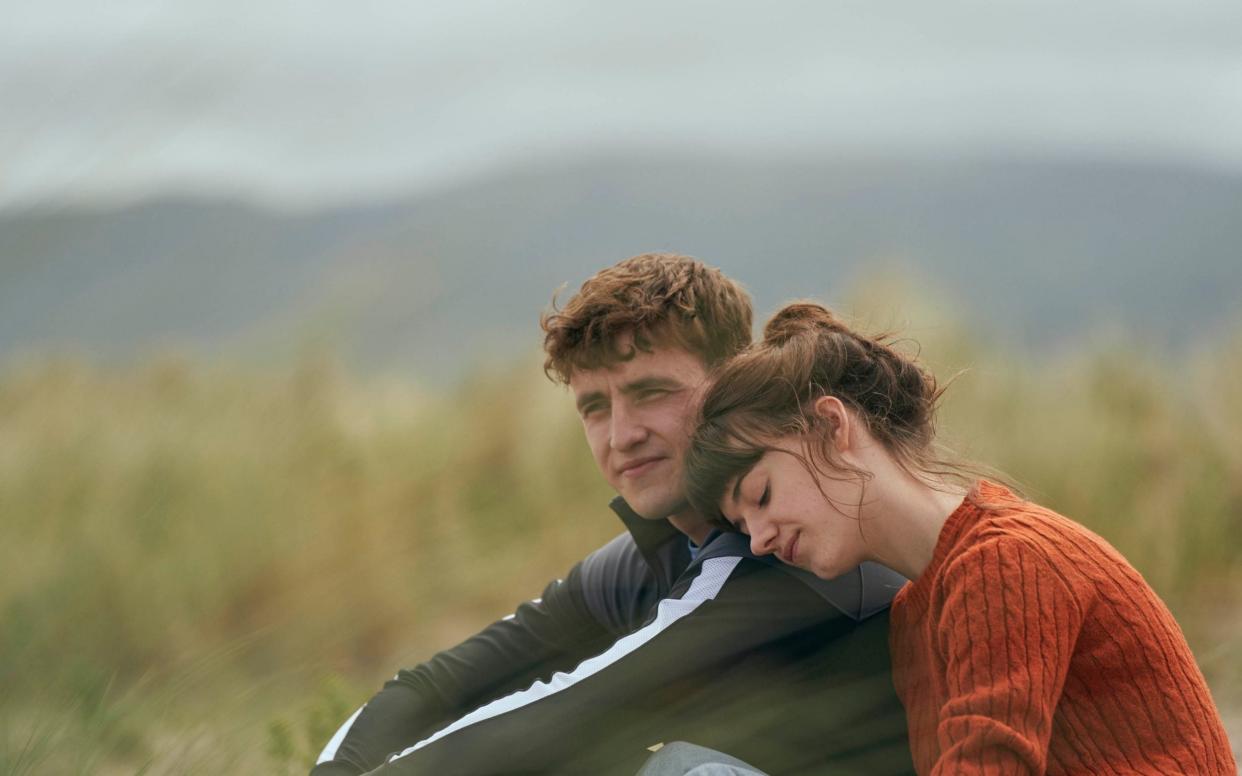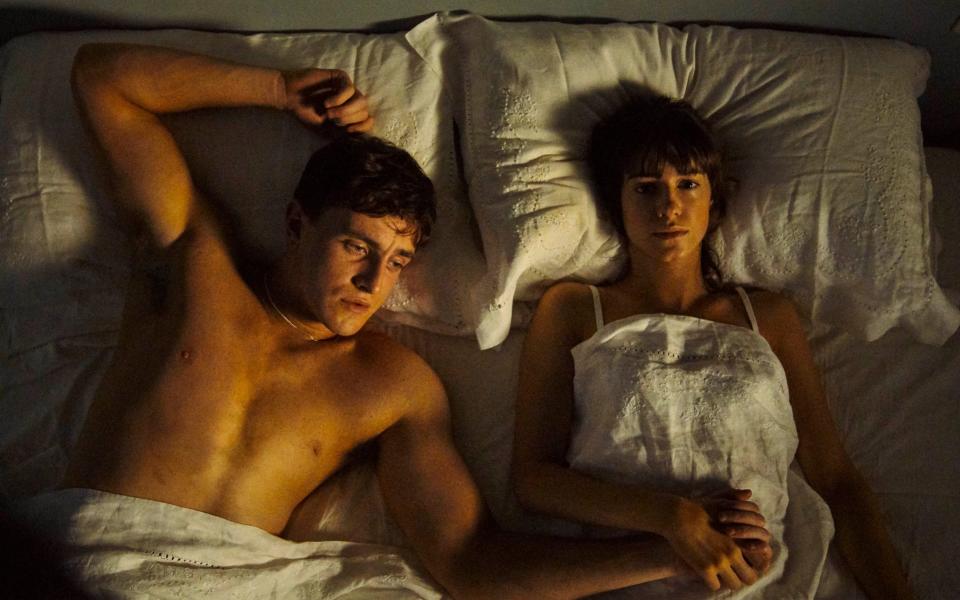The science behind why you never really get over your first love

When I was 18, I wrote a poem. To be more specific, it was a sonnet, dedicated to a boy I had only been dating for two months. I gave it to the boy as a present (mortifying) so I can’t remember it exactly, although I do recall a line where I compared him to a statue of Julius Caesar.
That, in a nutshell, encapsulates the intensity (and lunacy) of a first romantic relationship. It’s often less like the romanticised kissing-in-the-rain phenomenon of a Nicholas Sparks novel, however, and more akin to the deep bond between Connell and Marianne in Normal People.
The novel, by Sally Rooney, has been adapted for BBC One (although you can binge-watch on iPlayer). It focuses on the star-crossed Connell and Marianne, whose intense bond and secret romance lasts from school to university and beyond.
Why is their relationship, like so many ‘first loves’, so intense? “Falling in love in itself is an intense experience,” explains Dr Sheri Jacobson, clinical director at Harley Therapy. This is partly because of the rush of chemicals, mainly oxytocin - which gives the “sense of a high, or euphoria,” according to Dr Jacobson. Studies have found heightened levels of dopamine in those in new relationships, and one 2004 study found similar levels of serotonin in the bloodstreams of couples in love and people with obsessive compulsive disorders, suggesting a fixation - here, with the beloved.
While this might be true of any relationship in the ‘honeymoon period’, your first love is particularly powerful, and hard to forget, for the following reasons.
The 'first high'
Imagine going skydiving for the first time. The thrill and pump of adrenaline gives you a “similar type of rush” to your first kiss or your first relationship, according to Dr Veronica Lamarche, social psychologist and assistant professor at the University of Essex. “That’s particularly memorable,” she says, “whereas the next time you experience those things with someone, they’re not necessarily going to feel quite as exciting.”
Going one step further, Dr Jacobson likens it to the first ‘high’ you might experience with drugs, which feels more profound than subsequent attempts. “I want to link it up with addiction,” she says. “In a way, it’s a chemical boost as well as experiential novelty, that can make us quite fixated on a person.”

As it is a new experience, we are often ill-equipped to deal with this fixation in a healthy way. “While navigating new intimate relationships for the first time, adolescents lack the prior experience and emotional capacities to manage the intense emotions that arise,” says Jessica Kansky, a Life Fellow in the Clinical Psychology program at the University of Virginia, who specialises in early romantic relationships.
“Without the coping skills or communication strategies developed to manage the demands of a romantic relationship,” she adds, “teens are more likely to experience their romances as intense.”
You are an open book
In any romantic relationship, we tend to have a more powerful bond than we would with, say, a friend. “It’s the time spent, it’s the physical intimacy, that intensifies a relationship, and often a level of sharing,” Dr Jacobson says, adding that we often share more “secrets and uncomfortable thoughts” with a partner than we would with a friend.
This is even more the case in a first relationship - where you are often full of optimism. “We tend to let ourselves be more vulnerable, more risk-taking and take a leap of faith,” Dr Jacobson says. “I think that is part of what makes first love so unique, so intense, and so memorable - at the time, when you’re going through it, you feel that ‘this is it.’”
We are therefore more trusting and open in a first relationship - because, as Dr Jacobson says, “if you haven’t fallen in love yet, you haven’t had your first experience of heartbreak”. It is this experience of heartbreak that might, in the future, make us “hold back a little more” on what we share with our partners.
Instant gratification
Most of us experience our first romantic relationships in our late teens or early twenties - an age where “we are really sensitised to rewards,” according to Dr Lamarche. In other words, we seek things that feel good.
Relationships are reward-heavy, adds Dr Lamarche, as they are good at “providing you with emotional intimacy and physical intimacy”.
As part of their feel-good factor, the relationship might be “more instantly gratifying” than other aspects of your life (school, work or even friendships) and “maybe makes the other things around you seem a little bit less exciting”. This could explain why a teenager could neglect their friends and studies when they get into a new relationship. It’s not necessarily healthy but, Dr Jacobson says, it’s “one of those necessary rites of passage”.
It shapes who you are
“It’s fairly life-defining, your first love,” Dr Jacobson says. Your first relationship often coincides with other life-altering experiences - learning to drive, for instance, or getting drunk for the first time. “If,” Dr Jaconson says, “you’re with the person who’s your first love, they’re almost part of those milestones.”

Your first relationship might also help to validate your opinions; for instance, you might find a kindred spirit who shares your world views. They ‘get’ you in a way others, perhaps, do not. “This might be a point in time where you’re feeling disconnected from your family and the way your family sees the world,” Dr Lamarche explains. “And now you’re finding someone who validates exactly how you think and feel, and that can be really boosting and make you feel even more confident and even more validated about your views and beliefs.”
Your first romantic relationship, therefore, is “intertwined in your identity formation”, Dr Jacobson says. Our personalities, she says, continue developing until we reach our early 30s.
Due to our age, therefore, these early relationships “help us form a sense of who we are”, Dr Lamarche says. Your partner might affirm some of your attributes - they might note, for instance, that you are funny. Henceforth, this could become a way in which you think of yourself.
Memory and rose-tinted glasses
Memory is a fickle thing. “Our memory is often quite false,” Dr Jacobson says. “We remember good things more than we should and over-romanticise our past.” As your first relationship was so long ago, you tend to forget the complications, so “it becomes the rosier of all experiences”.
If you do look back with rose-tinted glasses, it could be a reflection on your current relationship status. “It can often be that there’s something about your current relationships that aren't matching that level of intensity or that level of validation that you're looking for,” says Dr Lamarche. That first relationship, therefore, “gives you an anchor to look back on”.
Your first love has a significant bearing on future relationships. “An important theory is that our first romantic experiences set the stage for our expectations and behaviors in future relationships,” Kansky says.
“If we have high quality early romantic relationships,” she adds, “we are more likely to continue experiencing high quality relationships - and all of the benefits that stem from them.”
Do you agree that you never truly get over your first love? Tell us what you think in the comments below.

